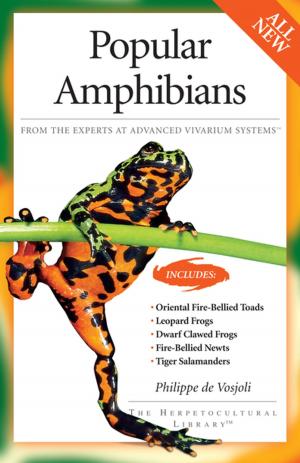Angelfish
Understanding and Keeping Angelfish
Nonfiction, Science & Nature, Pets, Fish, Home & Garden, Nature| Author: | David A. Lass | ISBN: | 9781620080016 |
| Publisher: | CompanionHouse Books | Publication: | May 8, 2012 |
| Imprint: | CompanionHouse Books | Language: | English |
| Author: | David A. Lass |
| ISBN: | 9781620080016 |
| Publisher: | CompanionHouse Books |
| Publication: | May 8, 2012 |
| Imprint: | CompanionHouse Books |
| Language: | English |
David A Lass’s introduction to angelfish fulfills its subtitle, Understanding and Keeping Angelfish,” and more. This colorful guide in the Fish Keeping Made Easy series discusses angelfish in their natural Amazon rain forest habitat in South America and the needs of this beautiful and recognizable fish in the home aquarium based on their dietary, water conditions, and behavior in the wild. The chapter Angelfish Groups” describes the three species of angelfish (Pterophyllum altum, P. leopoldi, and P. scalare), the most popular twelve color variations seen in local pet stores, and the special traits of the species. Separate chapters are devoted to selection and care, feeding and diet, and reproduction. The author discusses the keeping of angelfish in an all-angel” tank (shoal of angelfish!) as well as in a community tank, and gives solid advice on selection of equipment and live plants. A chapter on parasites and diseases will be of great use to all fishkeepers trying to avoid fungal, bacterial, and viral diseases in their tanks as well as general treatment protocols and hospital tanks. Glossary as well as resources of websites and publications conclude the guide.
David A Lass’s introduction to angelfish fulfills its subtitle, Understanding and Keeping Angelfish,” and more. This colorful guide in the Fish Keeping Made Easy series discusses angelfish in their natural Amazon rain forest habitat in South America and the needs of this beautiful and recognizable fish in the home aquarium based on their dietary, water conditions, and behavior in the wild. The chapter Angelfish Groups” describes the three species of angelfish (Pterophyllum altum, P. leopoldi, and P. scalare), the most popular twelve color variations seen in local pet stores, and the special traits of the species. Separate chapters are devoted to selection and care, feeding and diet, and reproduction. The author discusses the keeping of angelfish in an all-angel” tank (shoal of angelfish!) as well as in a community tank, and gives solid advice on selection of equipment and live plants. A chapter on parasites and diseases will be of great use to all fishkeepers trying to avoid fungal, bacterial, and viral diseases in their tanks as well as general treatment protocols and hospital tanks. Glossary as well as resources of websites and publications conclude the guide.















